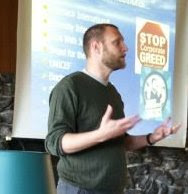Judgment and Justice
Luke 3:7-18 (part one)
These verses are a strange mix of judgment and justice.
John the Baptist warns people not to flee from judgment, but to perform acts that will stand them well. John uses the word "repentance" - which is always key, since repentance isn't something like feeling sorry or regretful, the Greek word is "metanoia", "change one's way of knowing."
Don't believe, John warns, that other qualifications will save you - and although John speaks of using the lineage of Abraham as cover, it brings to my mind those who use the name of Jesus as cover. Christians that claim that merely confession of Jesus' name and belief in him as some sort of supernatural savior will "save" them, these Christians seem fundamentally misguided. There is no "name" or label or single confession that saves, but acts of justice in the context of a changed heart and mind that "save." This is the point of John's claim that only trees that bear fruit will remain standing.
I don't like the undertone of vengeance and violence, but I do like the overall message. The crowd asks John: what do we do? And his response is fabulous: whoever has two coats must share with anyone who has none; and whoever has food must do likewise. Yee-freakin-hah.
While I want to talk about the "justice" verses, I'm feeling led to tarry with the judgment ones for a while. Indulge me.
God is able to raise up children of Abraham, so being one won't save (v 8) - in other words, since God can bring it about, it isn't really that important for our salvation. A possible midrash of this might be that we are able to do (called to do?) what God is not necessarily able to do - that is, make people (ourselves) treat others equitably. The axe that is lying at the root of the tree might not be God's "wrath", but the consequences of our own decisions - our choice to live in iniquity (inequality), to refuse to do what God cannot do without us. Those trees that do not bear good fruit (equality and justice) will be consumed by their own fires of greed and selfishness, while those that do bear good fruit will pass on seeds of generosity, sharing, compassion. Of course, we're always a mixed bag when it comes to what we are - what we inherited from those before us, what we've chosen, and what we pass on to others. So it isn't as if our judgment is final or singular. But, too, I suppose, an axe doesn't cut down a tree in one blow, either. In every act we are either chipping away at our roots or planting seeds of hope for the future. Either way, our fate seems certain, but we can pass on to others the possibility of a future time of equality. We are judged now - so that others later might live free.
These verses are a strange mix of judgment and justice.
John the Baptist warns people not to flee from judgment, but to perform acts that will stand them well. John uses the word "repentance" - which is always key, since repentance isn't something like feeling sorry or regretful, the Greek word is "metanoia", "change one's way of knowing."
Don't believe, John warns, that other qualifications will save you - and although John speaks of using the lineage of Abraham as cover, it brings to my mind those who use the name of Jesus as cover. Christians that claim that merely confession of Jesus' name and belief in him as some sort of supernatural savior will "save" them, these Christians seem fundamentally misguided. There is no "name" or label or single confession that saves, but acts of justice in the context of a changed heart and mind that "save." This is the point of John's claim that only trees that bear fruit will remain standing.
I don't like the undertone of vengeance and violence, but I do like the overall message. The crowd asks John: what do we do? And his response is fabulous: whoever has two coats must share with anyone who has none; and whoever has food must do likewise. Yee-freakin-hah.
While I want to talk about the "justice" verses, I'm feeling led to tarry with the judgment ones for a while. Indulge me.
God is able to raise up children of Abraham, so being one won't save (v 8) - in other words, since God can bring it about, it isn't really that important for our salvation. A possible midrash of this might be that we are able to do (called to do?) what God is not necessarily able to do - that is, make people (ourselves) treat others equitably. The axe that is lying at the root of the tree might not be God's "wrath", but the consequences of our own decisions - our choice to live in iniquity (inequality), to refuse to do what God cannot do without us. Those trees that do not bear good fruit (equality and justice) will be consumed by their own fires of greed and selfishness, while those that do bear good fruit will pass on seeds of generosity, sharing, compassion. Of course, we're always a mixed bag when it comes to what we are - what we inherited from those before us, what we've chosen, and what we pass on to others. So it isn't as if our judgment is final or singular. But, too, I suppose, an axe doesn't cut down a tree in one blow, either. In every act we are either chipping away at our roots or planting seeds of hope for the future. Either way, our fate seems certain, but we can pass on to others the possibility of a future time of equality. We are judged now - so that others later might live free.
Labels: Luke



0 Comments:
Post a Comment
<< Home